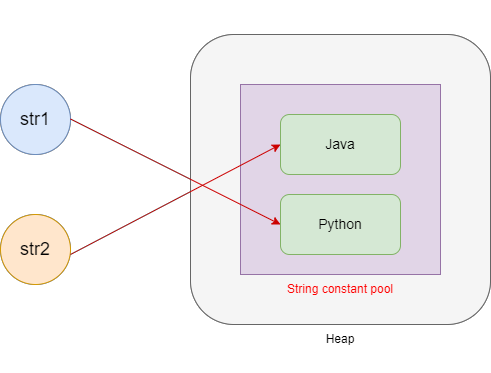What Is Unalterable Strings and How It Works
In the realm of programming, recognizing the concept of immutable strings is critical for developing protected and robust applications. Unalterable strings describe strings that can not be altered after they are created, ensuring data stability and predictability within the code. This basic concept plays an essential role in different programs languages and provides a distinct technique to managing data. By exploring the intricacies of just how unalterable strings operate, one can reveal a globe of benefits and possibilities that can elevate the quality and performance of software growth.
The Essentials of Immutable Strings
Immutable strings, as a basic concept in programming, are personality sequences that can not be transformed once they are created. This indicates that when a string is designated a value, that worth can not be changed. In languages like Python and Java, strings are immutable things, leading to numerous effects in terms of memory management and information integrity.
One of the crucial benefits of immutable strings is that they give a feeling of protection in data control. Because the web content of an unalterable string can not be modified, it ensures that the initial information stays undamaged, minimizing the threat of unintentional changes throughout program execution (Why are strings immutable in Java?). This property also simplifies debugging procedures, as designers can rely on that once a string is defined, its value will certainly not be unintentionally altered
When a new string is developed based on an existing one, instead than customizing the initial string, the new value is kept separately. Generally, understanding the essentials of immutable strings is critical for understanding programming concepts and enhancing code effectiveness.
Benefits of Unalterable Strings
Building upon the security and efficiency advantages of immutable strings, their benefits expand to boosting code dependability and simplifying concurrent programming jobs. By being unalterable, strings can not be customized after development, which gets rid of the threat of unexpected modifications in the data they keep. This integral immutability ensures that as soon as a string is created, its value continues to be continuous throughout the program's execution, decreasing the chances of pests brought on by unanticipated modifications.
Additionally, immutable strings add to code integrity by making it much easier to reason regarding the state of a program. Because strings can not be altered, developers can rely on that a string will always hold the very same value, simplifying debugging and upkeep efforts. This predictability brings about a lot more stable and reputable codebases.

Application in Shows Languages
Within different shows languages, the consolidation of unalterable strings is an essential element that influences how data is dealt with and manipulated within code frameworks. The implementation of immutable strings varies throughout different programs languages, with each language using its very own systems to support this idea.

On the other hand, languages like C and C++ do not have built-in assistance for immutable strings. Programmers in these languages must by hand implement immutability by imposing guidelines within their code to prevent straight alterations to string objects.
Ideal Practices for Dealing With Unalterable Strings
When dealing with immutable strings in programming languages like Java and Python, sticking to best techniques guarantees reliable and secure data adjustment. One of the crucial ideal practices is to use StringBuilder or StringBuffer rather than straight adjusting strings, especially when dealing with comprehensive concatenation operations. These courses offer mutable alternatives for string control, helping to stay clear of unnecessary memory appropriations and boosting performance.
An additional best method is to use string interpolation or formatting functions supplied by the language instead of manual concatenation. This not just improves readability but also aids in stopping common challenges such as unintentional string adjustments. Furthermore, when working with sensitive data such as passwords or API secrets, it is critical to prevent storing them as plain text in unalterable strings. Using protected storage space devices like char arrays or specialized libraries for handling sensitive details assists reduce security dangers connected with immutable strings.
Real-world Applications and Examples
Checking out practical executions of unalterable strings in different markets reveals their considerable effect on information integrity and system integrity. In the healthcare industry, unalterable strings play an essential function in making sure the protection and discretion of patient information. By protecting against unapproved modifications to sensitive details such as medical records and prescriptions, immutable strings aid preserve compliance with strict personal privacy policies like HIPAA.
Banks likewise take advantage of the immutable nature of strings to enhance the protection of consumer information and blog here purchase documents. Immutable strings help avoid fraud and unauthorized alterations to economic details, providing a robust protection versus cyber threats and making sure the count on and self-confidence of customers.

Verdict
Finest practices for working with unalterable strings include avoiding straight adjustments and utilizing approaches that return new string things. Real-world applications of immutable strings consist of data encryption, caching, and string adjustment jobs.
Immutable strings refer to strings that can not be altered after they are developed, ensuring data integrity and predictability within the code. When a brand-new string is produced based on an existing one, rather than customizing the original string, the new value is saved individually.In languages like Java and Python, strings are unalterable by default, suggesting that once a string item is produced, its value can not be transformed - Why are strings immutable in Java?. Finest techniques for working with unalterable strings consist of staying clear of direct adjustments and using approaches that return new string objects. Real-world applications of immutable strings include information security, caching, and string adjustment jobs